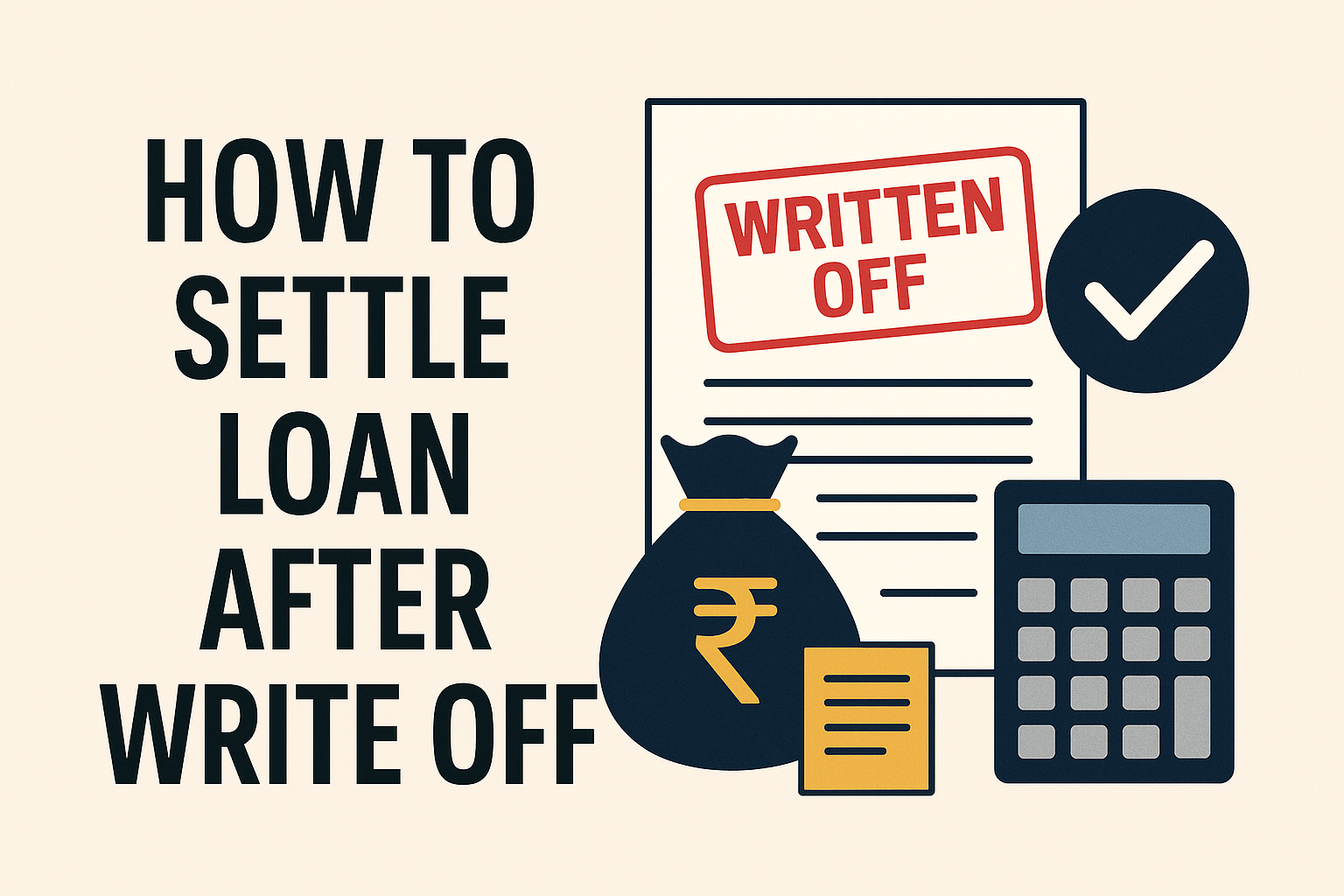Want to know how to settle loan after write off? You’re not alone. If you’ve ever defaulted on a loan, you’ve probably heard this scary line: “Sir, your account has been written off.”
At first, it sounds like good news—like your loan just vanished. But here’s the deal : a loan write-off doesn’t mean you’re off the hook. The bank’s just done some internal accounting magic to call it a loss. But that loan? Still sitting there with your name on it.
So here’s what most borrowers want to know: How to settle a loan after write off?
Short answer: YES. And sometimes, that’s actually your best shot at closing the chapter without more harassment.
In this post, I’ll break it down in plain English:

- What a write-off really means
- Why it’s NOT a waiver
- How to negotiate a smart settlement
- How it affects your CIBIL
- When and how to approach the lender
Let’s jump in.
Table of Contents
ToggleWhat Does “Written Off” Really Mean?
Missed EMIs for 6+ months? The bank marks it “written off”—which just means “we’ve given up chasing, let’s clean our books.” But it’s NOT a waiver. You still owe the money.
But—and this is key—you still legally owe them. It’s not a loan waiver. It’s a balance sheet clean-up.
So even if your account is marked “written off,” banks can:
- Send recovery agents (hello, phone calls at 9 PM!)
- Take legal steps
- Ruin your CIBIL with a big red “WRITTEN OFF” stamp
To understand how loan settlement affects your future borrowing, read our full guide on Personal Loan Settlement Process in India.

Founder, Sharma Debt Solutions
Loan Settlement Masterclass (Limited Seats)
Learn how banks evaluate settlements, how to stop recovery harassment, and how to settle loans legally & confidently.
Join the MasterclassCan You Settle After Write-Off?
Absolutely. In fact, this is when banks are often more open to negotiation.
Here’s why:
- They’ve already marked it as a loss
- Any recovery now is a bonus
- You’re showing initiative (which they love)
This is called a One-Time Settlement (OTS)—you offer a partial payment, and in exchange, they agree to close your account.
If you’re wondering how to settle loan after write off, this is the part you should pay close attention to.
Many borrowers don’t realize they can still settle loan after write off with the right approach and documentation.
Real-world example:
Loan Amount: ₹1.5 lakh
Outstanding after write-off: ₹1.2 lakh
You offer: ₹30,000
They agree: Boom—settled with a letter and NOC
Why Banks Say Yes to Settlements
Let’s be real. Banks don’t want to spend forever chasing bad loans. If they see that you’re genuinely trying to settle, they’ll usually consider it.
Win for the bank:
- They get something back (even 20–30%)
- One less NPA (Non-Performing Asset)
- Less staff time wasted
Win for you:
- No more calls, notices, or stress
- CIBIL starts to recover
- You get that sweet closure
How to Settle Loan After Write Off: Step-by-Step Guide
Here’s the blueprint. Follow this, and you’re in control:
Pull your CIBIL report
Spot the loan that’s marked “written off.” Note the lender name and outstanding amount.
You can get your free credit report from CIBIL’s official website — look for any accounts marked “Written Off”.
Contact the lender directly
Skip recovery agents if you can. Email or call the bank’s recovery/legal team.
Make a written offer
While making your offer, mention clearly that you’re trying to settle loan after write off in good faith and would like a one-time closure.
Don’t be shy. Start with 20%–25% of the total outstanding. Be polite but firm.
Get the deal in writing
Before paying a rupee, ask for a signed Settlement Letter stating:
- Amount accepted
- Last date for payment
- That it’s full and final
Make the payment
Use traceable methods—bank transfer, UPI, or demand draft. Keep receipts.
Collect the NOC
Demand a No Objection Certificate and final settlement confirmation.
Update CIBIL
After 30–45 days, check if it reflects. If not, raise a dispute with supporting docs.
Legal Stuff You Should Know
Look, this is important:
- Banks can still send legal notices—even after write-off
- Some file cases under Section 138 of the NI Act for EMI bounces
- You have to ask for settlement—they’re not obligated to offer
- And please, never rely on a verbal agreement. Get it in writing or don’t proceed.
What If They Say No?
It happens. Here’s what you can do:
- Wait and retry after a few weeks
- Increase the offer slightly (if you can)
- Ask for EMIs over 3 months instead of one-time
- Still getting harassment? File an RBI or Ombudsman complaint
- Also, track the calls using a harassment log tool (like SDS Harassment Tracker) so you have records.
How Does This Affect CIBIL?
This is the most common question.
Pros:
- Account gets marked “Settled” or “Closed”
- Recovery flags stop
Cons:
- Settled status is better than “Written Off,” but worse than “Paid in Full”
- History stays on your report for 7 years
But trust me—a settled loan looks way better than an unpaid, ignored one. It shows responsibility.
Best Time to Negotiate a Settlement?
Timing matters. Strike when:
- 180+ days have passed since default
- Loan is showing “Write-Off” on credit report
- You’ve received legal notice (but no award passed yet)
- Recovery activity is slowing down
Smart Tips to Settle Loan After Write Off
- Start low (20%) and slowly go up
- Never show desperation
- Use email/letter—not phone calls—for final agreement
- Ask for waiver on interest & penalty
- Don’t make any payment without written terms
Common Mistakes Borrowers Make
- Thinking “written off” = loan forgiven
- Paying without a Settlement Letter
- Believing recovery agents more than legal notices
- Not checking CIBIL after payment
- Settling via phone call (no written proof)
At Sharma Debt Solutions, we’ve helped 700+ borrowers negotiate smart settlements, stop recovery harassment, and close their debt chapter the legal way.
- ✅ Expert help drafting settlement offers
- ✅ CIBIL correction guidance
- ✅ Legal notice response support (advocate-reviewed)
WhatsApp : 9106484927 (Paid)
FAQs People Often Ask
Can I still settle a loan after it’s written off?
Yes, 100%.
A written-off loan doesn’t mean the bank has forgiven your dues. It simply means they’ve marked it as a loss in their books. You still legally owe the money, but the good news is — this is your best time to negotiate a settlement. Banks are more flexible post write-off because anything they recover is a bonus for them.
Will a write-off affect my CIBIL forever?
Not forever, but for a while — yes.
When your loan is written off, your CIBIL report shows a big red flag. Even after settling, it will be marked as “Settled” instead of “Closed”, and this status stays on your report for 7 years. But don’t worry — a settled account looks far better than an unpaid one. It shows you took responsibility and tried to fix the situation.
How much do banks accept in settlement after write-off?
There’s no fixed number, but based on real cases, most banks settle for 20% to 40% of the total outstanding — sometimes even less if the account is really old.
Here’s what helps:
– Time passed since write-off (older = better)
– Your genuine hardship story
– Negotiation skills (or expert help)
Pro Tip: Always get a written Settlement Letter before paying.
Wrapping Up: Should You Settle?
If your loan is written off and you’ve been losing sleep over calls, notices, and CIBIL mess—this is your shot to reset.
A smart settlement = less stress + legal peace + a better credit future.
So if you’re stuck and unsure how to settle loan after write off, now you know what steps to take.
Don’t wait for court summons. Take charge. Negotiate. Close the chapter.
Need Help?
We’ve helped 700+ borrowers:
- Draft powerful settlement offers
- Respond to arbitration and recovery threats
- Get official NOCs and closure
WhatsApp us: 9106484927 (Paid Guidance)
Take control before they do.
If you do like this article, share this with your friends and known ones.